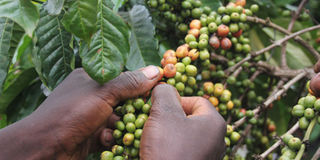Prime
UCDA kicks off campaign to boost coffee consumption

People involved in growing coffee may no longer have to wait three long years. File photo
What you need to know:
Projection. An increase in local consumption to only 20 per cent will bump up the economy
Kampala.
A campaign to motivate Ugandans to consume coffee has been started.
According to the architects of this move including Inspire Africa, Uganda Coffee Development Authority (UCDA) and Usaid Feed the Future, think that in the next five years, local consumption will have improved to 20 per cent up from 3 per cent.
The campaign week starts on Monday with a coffee expo, barista competition and coffee cocktail in Kampala.
Mr Nelson Tugume, the chief executive officer Inspire Africa, during the launch of the campaign in Kampala on Tuesday, said: “Coffee being the second most traded commodity in the world market after oil, an increase in local consumption to only 20 per cent will drastically bump up the economy.”
He said through increased consumption will accrue quality production, create jobs, and value addition will fetch higher prices and boost incomes in the pockets of the people.
Statistics
Uganda currently produces about 3.5 million 60 kg bags of coffee which earn the country $450 million (Shs1.5 trillion) per annum. Coffee export contributions to the Gross Domestic Product (GDP) stands at 1.8 per cent, while the 3 per cent domestic coffee consumption contributes 1.35 per cent to the GDP but earn the country about $340 million (Shs1.1 trillion) annually if a cup is put at half a dollar.
“An increase to 10 per cent will grow the contribution of the domestic coffee consumption, earn the country $2.3 billion (Shs7.7 trillion) and this will translate into about 11.4 per cent to our GDP,” Mr Tugume said.
He said the campaign is intended to draw the attention of Ugandans to the numerous benefits of consuming coffee, both health and the financial benefits to farmers and companies involved in coffee as well as to the entire nation.
State minister for Agriculture, Mr Christopher Kibanzanga, said: “Most farmers fear to engage in coffee farming because of its long gestation period and forget about the lifetime benefits.”
He said Uganda’s coffee exports should be increased to at least 20 million 60 kg bags in the next five years and this is going to be boosted by the massive growing engineered by the UPDF and National Agricultural Advisory Services.
Major factor
Mr Tugume further explained that one of the major reasons for the low consumption locally is the long time Ugandans have been led to believe that coffee is simply a cash crop.
“We need to wake up and know what makes business sense as ordinary people and as a country. So we have always known that we only grow coffee for export,” he noted.
In line with this vision, Inspire Africa is looking forward to creating a behavioural change in Ugandans by highlighting the various opportunities through the entire value chain, as well as offer training and mobilise logistical support to help interested youths start up business in the sector.
Mr Mathias Kasamba, a prominent coffee farmer commenting about this campaign, said: “Coffee is the next big thing for Uganda.
The drive
During this campaign, a motor vehicle will be serving 20,000 cups of coffee around Kampala for a week and later the drive will go to the rest of the country, meeting with farmers and testing their coffee.




